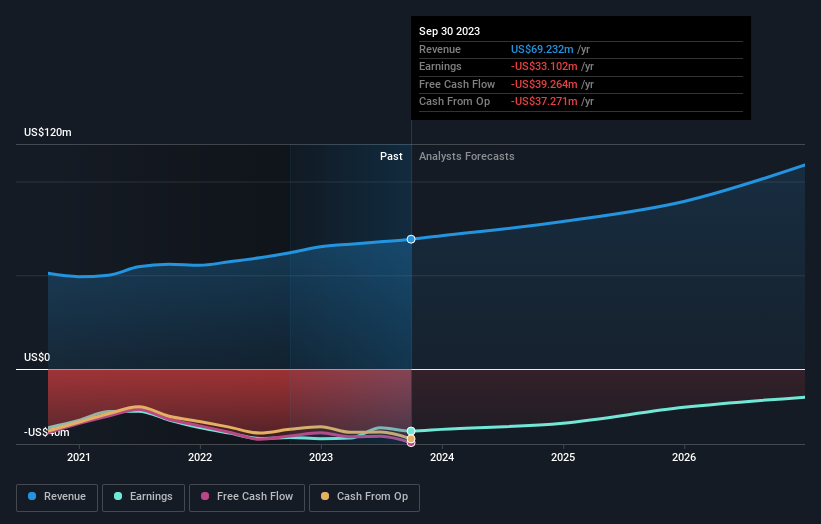After losing 41% in the past year, Neuronetics, Inc. (NASDAQ:STIM) institutional owners must be relieved by the recent gain
Key Insights
Given the large stake in the stock by institutions, Neuronetics' stock price might be vulnerable to their trading decisions
The top 10 shareholders own 51% of the company
Every investor in Neuronetics, Inc. (NASDAQ:STIM) should be aware of the most powerful shareholder groups. The group holding the most number of shares in the company, around 39% to be precise, is institutions. Put another way, the group faces the maximum upside potential (or downside risk).
Institutional investors would probably welcome last week's 16% increase in the share price after a year of 41% losses as a sign that returns may to begin trending higher.
Let's take a closer look to see what the different types of shareholders can tell us about Neuronetics.
View our latest analysis for Neuronetics
What Does The Institutional Ownership Tell Us About Neuronetics?
Institutional investors commonly compare their own returns to the returns of a commonly followed index. So they generally do consider buying larger companies that are included in the relevant benchmark index.
We can see that Neuronetics does have institutional investors; and they hold a good portion of the company's stock. This suggests some credibility amongst professional investors. But we can't rely on that fact alone since institutions make bad investments sometimes, just like everyone does. It is not uncommon to see a big share price drop if two large institutional investors try to sell out of a stock at the same time. So it is worth checking the past earnings trajectory of Neuronetics, (below). Of course, keep in mind that there are other factors to consider, too.
It would appear that 28% of Neuronetics shares are controlled by hedge funds. That's interesting, because hedge funds can be quite active and activist. Many look for medium term catalysts that will drive the share price higher. Archon Capital Management LLC is currently the company's largest shareholder with 9.9% of shares outstanding. Cannell Capital LLC is the second largest shareholder owning 9.8% of common stock, and Kent Lake Capital, LLC holds about 8.1% of the company stock. Additionally, the company's CEO Keith Sullivan directly holds 1.9% of the total shares outstanding.
We did some more digging and found that 10 of the top shareholders account for roughly 51% of the register, implying that along with larger shareholders, there are a few smaller shareholders, thereby balancing out each others interests somewhat.
While studying institutional ownership for a company can add value to your research, it is also a good practice to research analyst recommendations to get a deeper understand of a stock's expected performance. Quite a few analysts cover the stock, so you could look into forecast growth quite easily.
Insider Ownership Of Neuronetics
The definition of an insider can differ slightly between different countries, but members of the board of directors always count. Management ultimately answers to the board. However, it is not uncommon for managers to be executive board members, especially if they are a founder or the CEO.
Insider ownership is positive when it signals leadership are thinking like the true owners of the company. However, high insider ownership can also give immense power to a small group within the company. This can be negative in some circumstances.
We can see that insiders own shares in Neuronetics, Inc.. In their own names, insiders own US$4.9m worth of stock in the US$101m company. This shows at least some alignment, but we usually like to see larger insider holdings. You can click here to see if those insiders have been buying or selling.
General Public Ownership
The general public, who are usually individual investors, hold a 29% stake in Neuronetics. This size of ownership, while considerable, may not be enough to change company policy if the decision is not in sync with other large shareholders.
Next Steps:
It's always worth thinking about the different groups who own shares in a company. But to understand Neuronetics better, we need to consider many other factors. For example, we've discovered 5 warning signs for Neuronetics (1 is potentially serious!) that you should be aware of before investing here.
If you would prefer discover what analysts are predicting in terms of future growth, do not miss this free report on analyst forecasts.
NB: Figures in this article are calculated using data from the last twelve months, which refer to the 12-month period ending on the last date of the month the financial statement is dated. This may not be consistent with full year annual report figures.
Have feedback on this article? Concerned about the content? Get in touch with us directly. Alternatively, email editorial-team (at) simplywallst.com.
This article by Simply Wall St is general in nature. We provide commentary based on historical data and analyst forecasts only using an unbiased methodology and our articles are not intended to be financial advice. It does not constitute a recommendation to buy or sell any stock, and does not take account of your objectives, or your financial situation. We aim to bring you long-term focused analysis driven by fundamental data. Note that our analysis may not factor in the latest price-sensitive company announcements or qualitative material. Simply Wall St has no position in any stocks mentioned.

 Yahoo Finance
Yahoo Finance 

